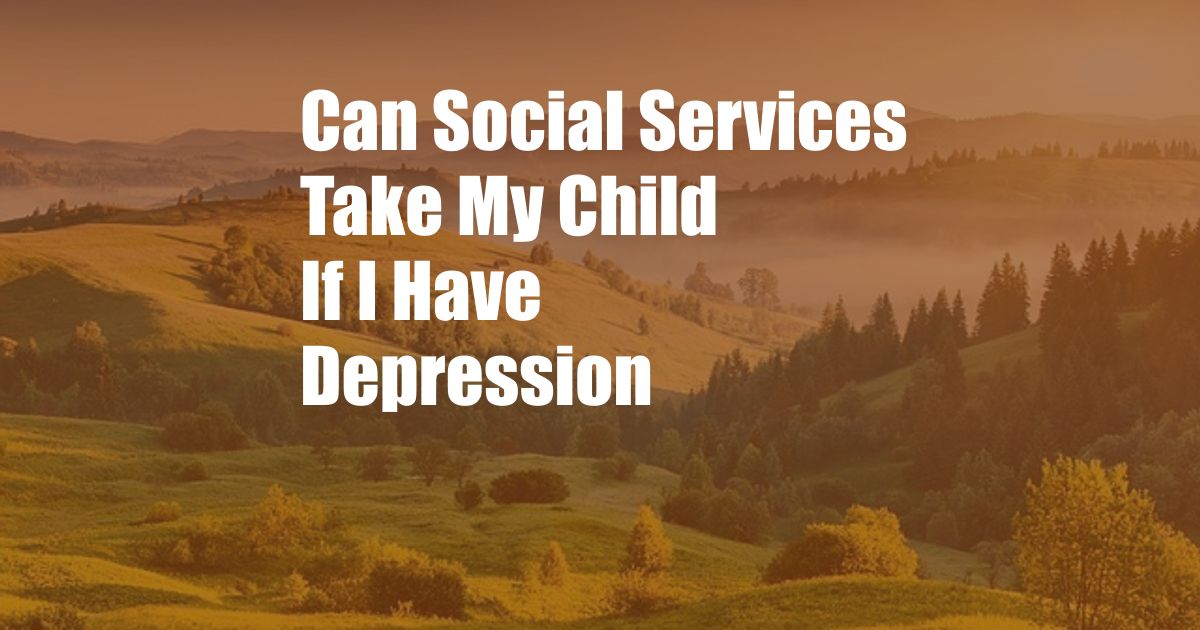
Can Social Services Take My Child if I Have Depression?
As a parent, the well-being of your child is your utmost priority. However, life can throw unexpected challenges, such as mental health issues like depression. Understandably, this can raise concerns about the potential involvement of social services and the possibility of having your child taken away. In this article, we will delve into this sensitive topic, exploring the complexities
Depression, a mood disorder characterized by persistent sadness and a loss of interest or pleasure in activities, can significantly impact a person’s life. While it can be challenging for individuals of all ages, it’s particularly concerning when it affects parents responsible for the care of their children.
Depression and Parental Responsibilities
Depression can affect a parent’s ability to fulfill their responsibilities effectively. It may impair their judgment, making it difficult to provide adequate care for their child. In severe cases, depression can lead to neglect or even abuse, putting the child’s well-being at risk.
However, it’s crucial to understand that depression does not automatically equate to an inability to parent. With proper treatment and support, many parents can continue to provide a loving and nurturing environment for their children. Social services agencies recognize that mental health conditions can be addressed, and they often work with families to provide the necessary assistance.
When Social Services May Intervene
Social services may become involved if there is a concern that a child’s well-being is being compromised due to a parent’s depression. The decision to remove a child is not taken lightly and is based on a careful assessment of the situation.
Factors that may trigger social services intervention include:
- Severe depression that impairs a parent’s ability to care for the child
- Neglect or abuse resulting from the parent’s depression
- Lack of a support system or resources to assist the parent
- Concern for the child’s immediate safety or well-being
Seeking Help and Prevention
If you are a parent struggling with depression, it’s essential to seek professional help as soon as possible. Treatment options such as therapy, medication, and support groups can effectively manage depression and improve your ability to parent.
Additionally, reaching out to family, friends, or community organizations for support can provide a safety net during challenging times. By being open and proactive about your mental health, you can reduce the likelihood of social services involvement and create a stable and loving environment for your child.
Tips and Expert Advice for Parents with Depression
Here are some tips and expert advice for parents with depression:
- Prioritize your mental health: Seek professional help and adhere to your treatment plan.
- Build a support system: Connect with family, friends, or support groups for emotional and practical assistance.
- Create a routine: Establish a daily routine that includes time for self-care and activities with your child.
- Be open and honest: Inform your child about your depression in an age-appropriate manner.
- Don’t be afraid to ask for help: Reach out to your support system or social services for assistance when needed.
General FAQ on Depression and Social Services Involvement
Q: Can I lose my child if I have depression?
A: The involvement of social services does not automatically lead to the removal of your child. Social workers aim to support families and provide assistance. However, if there are serious concerns about your child’s well-being, they may intervene to protect the child’s safety.
Q: What factors determine if social services will remove my child?
A: Social services consider various factors, including the severity of your depression, your ability to care for your child, the presence of a support system, and the immediate risk to your child’s well-being.
Q: What can I do to prevent social services involvement?
A: Seek professional help for your depression, build a support system, establish a routine, be open and honest with your child, and don’t hesitate to ask for help when needed.
Conclusion
Depression is a treatable mental health condition that should not automatically lead to the removal of a child from their home. Social services agencies prioritize the well-being of children and work with families to provide support and assistance. By prioritizing your mental health, seeking help, and creating a stable environment for your child, you can minimize the likelihood of social services involvement and maintain a loving and supportive relationship with your child. If you are concerned about your ability to parent due to depression, reach out for help to ensure the best outcome for you and your child.